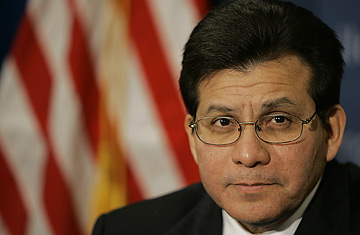
U.S. Attorney General Alberto Gonzales
Sources tell TIME that discussions are under way on Capitol Hill about whether to offer just such a deal to the key former aide to Attorney General Alberto Gonzales. The discussions — still largely informal — follow Goodling's assertion of her Fifth Amendment privilege to refuse to testify about her role in the controversial firings. Were Goodling to receive some form of immunity, she could be legally compelled to testify or risk facing charges of contempt of Congress.
No decision to seek immunity for Goodling has yet been made. But the question of immunity may be inevitable, because of what some observers see as an endgame for Gonzales, who is scheduled to deliver crucial testimony on his role in the firings next Tuesday before the Senate Judiciary Committee. Democrats have stressed that even if Gonzales resigns, their investigation into the dismissal of the U.S. attorneys will continue. In that event, the investigation's focus would likely shift to the role of the White House in the firings, and Goodling's contacts with the office of former White House counsel Harriet Miers and of top political advisor Karl Rove might be crucially important.
In fact, Goodling's testimony could prove more important than ever, given today's White House acknowledgement that numerous e-mails to and from key White House staff may have been lost or deleted in a violation of internal rules. What those messages might prove is uncertain, but many apparently involve Karl Rove, who reportedly used e-mail accounts as well as a Blackberry provided by the Republican National Committee for much of his computer traffic.
"Monica Goodling is the jugular that connects DOJ and the White House on this issue," says Bruce Fein, a well-known conservative lawyer and former senior official in the Reagan Justice Dept. "The obvious possibility that she might be given a grant of immunity will put the fear of God into other witnesses and encourage their truth telling."
Goodling, 33, a graduate of Pat Robertson's Regent University Law School, resigned from the Justice Dept April 7. Several days before, her Washington lawyer, John Dowd, invoked her Fifth Amendment privilege and informed Congress that she would not answer questions about the dismissal of the U.S. attorneys. (The White House and Justice have denied allegations that the targeted prosecutors were fired because they were either pursuing either too many corruption cases against Republicans or too few against Democrats.) Among the grounds cited for Goodling's decision to invoke the Fifth Amendment was the fact that Deputy Attorney General, Paul McNulty, has blamed Goodling for withholding information in preparing McNulty's Congressional testimony in February on the U.S. attorney dismissals, testimony that he has privately acknowledged was inaccurate. Goodling has denied that she failed to adequately prepare McNulty or withheld anything.
Lawyers say that if Goodling were granted immunity in exchange for her testimony, it would most likely be so-called "use immunity" — meaning that none of her statements could be used to prosecute her for past crimes. That would mean she would no longer have any basis to assert her Fifth Amendment right to refuse to testify.
This week, Congressional committees are conducting private interviews with top Justice Dept. witnesses, including Gonzales' former chief of staff, Kyle Sampson, who may shed more light on the U.S. attorney firings, possibly including the role of the White House. Sometime later, the committees are expected to interview Rove, former White House counsel Harriet Miers and others, but the conditions under which they will provide evidence is still being negotiated. The White House has continued to insist they would not testify under oath or with a transcript of the proceedings.
Legal experts say it is only after exhausting those alternative sources of information that the Congressional committees would decide whether or not to compel Goodling's testimony, a step that involves several additional hurdles. To begin with, an immunity offer — presumably from the Senate or House Judiciary Committees — would require a two-thirds vote of those committees. That would mean Republicans as well as Democrats would have to support the move, hardly a given. However, Republicans might have a difficult time standing in the way of Goodling's testimony if it were portrayed by Democrats as essential part of a search for the truth.
After that, standard procedure in immunity cases would require the Committee to alert the Justice Dept. of an impending immunity offer. The Justice Dept. would have up to 30 days to respond, although in Goodling's case, experts say it is very unlikely there would be an objection.
